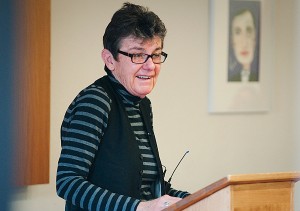Yesterday (or was it the day before?) we wrote about California as a literary epicenter. What could be more timely, then, than the announcement that Marin poet Kay Ryan is among those who will receive the National Humanities Medal this year? (We’ve written about her oh, here and here and here and here.) Here’s what Steve Moyer at the NEH said about the Pulitzer Prize winner, MacArthur Fellow, and former U.S. poet laureate:
Her work is accessible and witty, marked by mordant humor and word play, but with serious intent and long-lasting impact on readers. “I want something to get done in a poem,” she said recently in a telephone interview. “I want to know something I didn’t know.” Her use of what she has termed recombinant rhyme is one of her defining characteristics. Her tightly woven verse (lines are sometimes no more than two or three syllables) can ponder a philosophical conundrum, crystallize an irony, or hold up for brief yet piercing examination the opposing poles of a contradiction. Poet and editor J. D. McClatchy has said of Ryan’s work, “Her poems are compact, exhilarating, strange affairs, like Satie miniatures or Cornell boxes.” …
Ryan, born in San Jose, California, in 1945, grew up in towns in the San Joaquin Valley and the Mojave Desert, where she was something of a class clown and from childhood had a “rapaciousness for language.” Her father worked as a ranch hand, an oil driller, and a prospector on a chromium claim. He died when Ryan was nineteen, prompting “After Zeno,” an unsentimental meditation on lives that overlap until the day when suddenly, they no longer do. The four-stanza poem begins, “When he was / I was. / But I still am / And he is still.” After positing questions about time and plurality, the poem—her first—concludes, “There’s no sense / In past tense.” …
Surprisingly, Ryan says she reads little poetry, fiction, or history, opting instead for the “belle lettrists,”—essays on literature by Italo Calvino, Milan Kundera, Vladimir Nabokov, and Joseph Brodsky. She prefers not to read fellow poets because, as she slyly puts it, “Like eucalyptus trees, they poison the soil beneath them so nothing else can grow there.” Ryan has other reading tics. She doesn’t like electronic reading devices, she chuckles, because she feels compelled to physically deface a book by taking notes in the margins.
And the future of poetry? “It will change platforms maybe, but I don’t worry about poetry or people reading poetry. It will survive because it’s pleasurable and is the most expedient method for certain kinds of exchange.”
It’s always pleasant to see friends’ names on the list … or even acquaintances. I’ve interviewed playwright Tony Kushner before, in an article about his former mentor, Carl Weber. It was a fun interview, though it took eons to schedule through intermediaries. Another famous Californian, George Lucas, will be awarded, as will playwright Anna Deavere Smith and author Joan Didion will also be awarded, and Robert B. Silvers (of New York Review of Books fame).
Other winners include: Edward L. Ayers, William G. Bowen, Jill Ker Conway, Natalie Zemon Davis, Frank Deford, Robert Putnam, Marilynne Robinson, and Camilo José Vergara.
The awards ceremony will take place … tomorrow!
Tags: "Kay Ryan", Anna Deavere Smith, Robert B. Silvers, Tony Kushner



